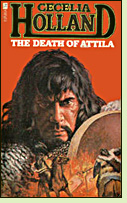The Death of Attila
by Cecelia Holland
Reviewed by David Maclaine

The incredible accomplishment of The Death of Attila is not easy to explain. The waves of invaders who broke through the Western Roman Empire's defenses and brought the classical age to a close had been driven westward by a massive movement into the grasslands north of the Black Sea by a nomadic people who became known as the Huns. Half a century later they held most of Europe in their grasp. Tribute flowed from the unsacked cities to the overlord we remember as Attila the Hun. But his empire quickly crumbled upon his death. Holland's astonishing novel answers the question: "Who were these people who changed the course of history?" in a way that feels far more real than the droning of history professors. She takes us into a vanished world, inside the tents and deep into the minds of the tough little people who for a while were Europe's overlords. It is a tribal world of shamans who gaze uncomprehendingly at the Christian monk who tries to share his vision of a benevolent god; it is also a world of men and women who pass their intoxicating White Tea back and forth from friend to friend, who laugh and posture before the time comes to ride and die.
The novel begins with the homeward journey of Tacs, a scout left behind during Attila's great raid on Italy. We follow his return with a friend's body and his budding friendship with Dietric, whose father is king of the Gepids, a subject people sharing the plains of what is now Hungary with the people who gave that land its name. The two journey together on a diplomatic mission. Soon after their return the event occurs that gives The Death of Attila its title. Taks' world spins into chaos, and the friends tumble toward a tragic denouement. Through the eyes of a handful of utterly real people we gaze into a new world and then watch that world fall apart. (1973, 284 pages)
More about The Death of Attila at Powell's Books or Amazon.comOther novels about Attila:
The Darkness and the Dawn by Thomas B. Costain (1959). More info
Scourge of God by William Dietrich (2005). More info
The Sword of Attila by Michael Curtis Ford (2005). More info
Nonfiction about Attila:
The Night Attila Died: Solving the Murder of Attila the Hun by Michael A. Babcock (2005). More info
Attila: The Barbarian King Who Challenged Rome by John Man (2006). More info
The End of Empire: Attila the Hun and the Fall of Rome by Christopher Kelly (2010). More info
Online:
Attila at Wikipedia
Back to Novels of Ancient History
Back to Directory of Book Reviews